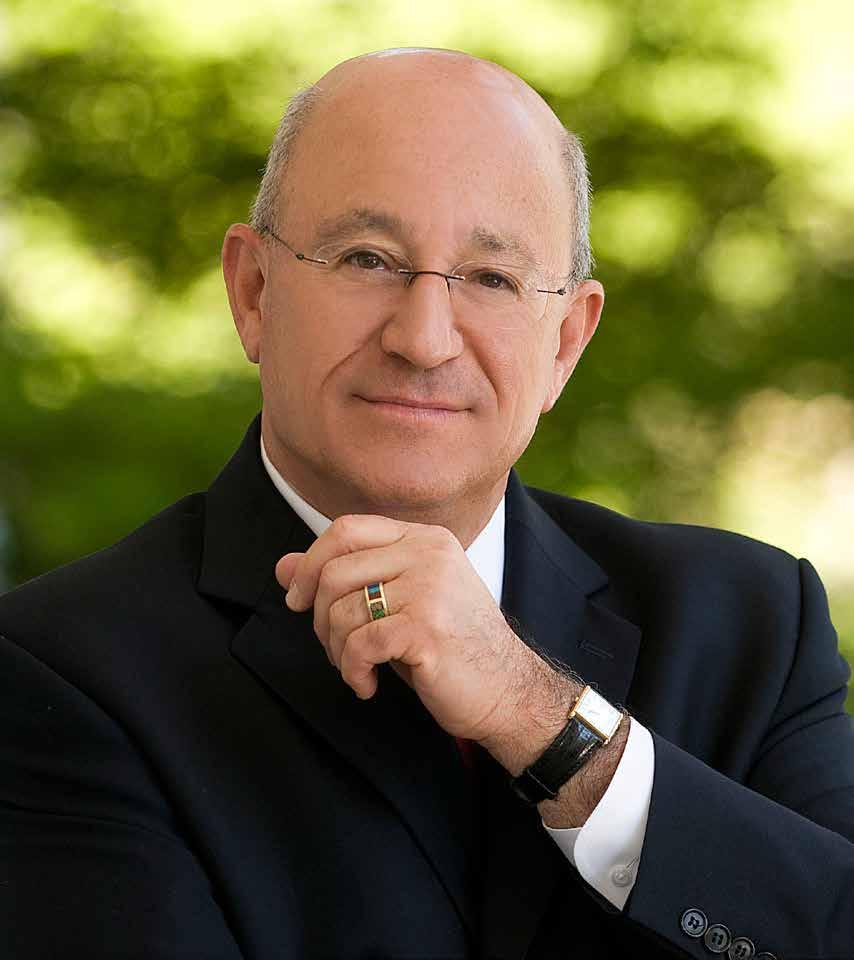
12 minute read
Ask the Experts
Can a Board of Directors Remove One of its Members from Office?
By Derek Cole, Partner and Co-founder, Cole Huber LLP
Can a special district’s board of directors remove one of its members? What if that member is constantly disruptive during meetings? What if he or she is abusive toward the public or district employees? Or what if a member puts no time or effort into doing his or her job? Are these or any other grounds ever cause for a board to vote to expel one of its members?
The short answer is no. California law generally leaves it to voters to decide the fate of elected officials who, for whatever reasons, choose not to perform their duties or who act disruptively or abusively. The usual remedies for dealing with these types of officials—defeat at the next election and recall—are political, not legal.
There are, however, a few situations in which elected officials can be deemed to forfeit their offices. In these situations, California law considers an elected office “vacant.” The most obvious of these situations are when an elected official resigns or moves out of his or her district or agency territory. (Gov. Code, § 1770(c)(1), (e).)
But there are other—and less voluntary— situations in which offices can become vacant. Of note, an elected official who leaves the state
“without the permission required by the law beyond the period allowed by law” vacates his or her office. (Gov. Code, § 1770(f).) An office also becomes vacant when an official ceases “to discharge the duties of his or her office for the period of three consecutive months,” except in cases of sickness or permission for his or her absence from the state. (Gov. Code., § 1770(g).)
Unfortunately, there are few court cases that elaborate on when or how these grounds for vacancy are established. But it does appear that a board member who spends lengthy and continuous periods of
time travelling out of state may be found to vacate an office. Equally, it appears a member can vacate an office when he or she devotes no time or attention to a position for an excessive period. In short, chronic absenteeism—especially when it involves the continuous failure to attend board meetings—can be cause for forfeiting one’s office.
But how can an official be removed from office on this basis? Not simply by a majority vote of the governing board. A special district’s recourse, rather, is to file a legal proceeding known as “quo warranto.” This is essentially a civil lawsuit against the offending member, but one that requires the advance permission of the State Attorney General to file. If authorized, this type of legal proceeding is not quick or easy. Although courts are required to give these proceedings calendar preference, the proceedings can take several months and can be costly to pursue—especially for smaller agencies.
As a practical matter, special districts’ options for dealing with derelict board members are very limited. Other than the quo warranto proceeding that may be authorized in severe cases of absenteeism, there is no legal means to compel a member to fairly or faithfully perform his or her duties. The only option in a case of a member’s neglect of duties may be CSDA Spring 2020 - 1/4 pg. Ad
a public reproval by his or her fellow board members. This can be done through a device in parliamentary procedure known as a “censure”—a motion or resolution in an open meeting rebuking the member for his or her behavior or dereliction of duties. Although a censure has no binding effect, it can certainly educate voters about a member’s misdeeds or abuses of office.
Derek Cole is a partner and co-founder of Cole Huber LLP, a law firm with offices in Roseville and Ontario. He serves as a city attorney and general counsel to a number of special districts. He may be reached at (916) 780- 9009 or dcole@colehuber.com.
UtilityBilling DoneBetter.
Efficient, effective, time-saving software solutions forCalifornia cities and special districts.


Applications include: • UtilityBilling • CashReceipting • Accounts Receivable • Budget Prep • Accounting • Payroll • ServiceOrders • And manymore! Easy-to-use utility billing software Built-in interface with most standard meter reading systems Knowledgeable, professional, “small town” friendly support FREE on-going training
California Special Districts introduces you to 2020 CSDA General Manager Leadership Summit Opening Keynote Speaker Bruce Tulgan, founder and CEO of RainmakerThinking, Inc., a management research and training firm, as well as RainmakerLearning an online training resource. Bruce is an adviser to business leaders all over the world and a sought-after keynote speaker and seminar leader. He is the best-selling author of numerous books including Not Everyone Gets a Trophy, Bridging the Soft Skills Gap, The 27 Challenges Managers Face, and It’s Okay to be the Boss. Bruce lectures at the Yale Graduate School of Management, as well as other academic institutions. He has written for the New York Times, the Harvard Business Review, HR Magazine, Training Magazine, and the Huffington Post.
MORE ABOUT THE KEYNOTE SESSION ON PAGE 6.
California Special Districts • Mar-Apr 2020 CSDA’s 2020
GENERAL
MANAGER LEA ERSHIP SUMMIT
There Are Seven Myths Holding Managers Back
Managers today are under more pressure than ever. It keeps getting harder to manage people, retain the best talent, and develop new leaders. There are key areas of leadership with which many managers are struggling. Yet, the biggest thing getting in the way of most managers is their mindset. Common myths about leadership and management are holding back too many otherwise great leaders in the workplace. There are seven myths that I have seen hinder managers time and again. Here is a breakdown of what those myths look like and their opposing realities.
1. The Myth of Empowerment: The way to empower people is to leave them alone and let them manage themselves.
The myth of empowerment is the biggest and most pernicious management myth. Leaving people to sink-or-swim is not empowerment—it’s negligence. It is the definition of what I call “false empowerment.”
But the reason so many managers are trapped by this myth is that, for the most part, they are afraid of micromanagement. Many managers often second-guess their own instincts, afraid their employees will fire back with, “Don’t micromanage me!”
The reality is that almost everybody performs better with more guidance, direction, and support from a more experienced person. Think of yourself like a coach to a professional athlete.
2. The Myth of Fairness: The way to be fair is to treat everyone the same.
This myth is the combined result of several factors. First, that HR has an (understandable) aversion to litigation risk that has led to a presumption that any differential treatment is somehow “against the rules.” Second, that some people have become wary of political correctness to the point of selfcensoring any mention of differences between and among individuals—even observable merit-based ones. And third, the popular misunderstanding of human development theory, which holds that “we are all winners.”
The reality is that performance is relative. Some outperform others. In that case, treating everybody the same, regardless of their behavior, is what’s truly unfair.
3. The Myth of the Nice Guy: The only way to be strong is to act like a jerk, but I want to be a “nice guy.”
Lots of managers act like jerks. That doesn’t mean they are strong. That doesn’t mean they are effective. It just means they are acting like jerks.
The reality is that real “nice guy” managers do what it takes to help employees succeed so those employees can deliver great service and earn more rewards for themselves.
4. The Myth of the Difficult Conversation: Being hands-off is the way to avoid confrontations with employees.
Most managers find that the most painful and damaging aspect of managing is when they must have very difficult conversations with employees. They believe that being a strong manager requires or even causes these confrontations.
The reality is that being a weak manager makes these conversations inevitable, whereas being a strong manager means even the most difficult confrontations rarely occur, and when they do happen, they are not so painful after all.
5. The Myth of Red Tape: Managers are prevented from being strong because there are many factors beyond their control—red tape, corporate culture, senior management, limited resources, etc.
Managers tell me every day that despite their best efforts, they are held back by rules and red tape. And almost always, right beside them, in the very same organization with the very same rules, there are lots of managers who find ways to work within and around the rules. It’s difficult, but they do it anyway.
The reality is that the rules are most often there for a good reason. All it takes is an understanding of the rules, exactly what they are and are not. Managers should endeavor to make strong relationships with folks in HR who can help them navigate the red tape effectively.
6. The Myth of the Natural Leader: I am just not “good at” managing.
The underlying theory here is that some people are natural leaders and therefore the best managers. Try as they might, others without that natural ability will never be able to achieve a high level of management.
The reality, of course, is that management is a skill like anything else. With dedication and practice, anyone can become a great manager. And while some people may have that special brand of charm or charisma—that doesn’t necessarily mean they are good at managing people. Natural leaders are sometimes the ones who come in with enthusiasm and energy, but not very much of a plan, causing team members to run wildly off in different directions.
7. The Myth of Time: There isn’t enough time to manage people.
There is only so much time in a week, and many managers feel there’s simply not enough time for them to complete their own work in addition to managing others. The irony is that not investing time managing is what costs the most time in the end.
It’s what I call the vicious cycle of undermanagement.
It may seem counterintuitive at first but it’s what works— the only way to get back your time is to start spending more time managing others.
How Special Districts Can Lead California’s Response to Climate Change

By Pedro Nava, Chairman, Little Hoover Commission
There is no doubt that climate change poses a very real threat to California. From rising ocean levels threatening our coastline to dwindling Sierra snowpack causing severe droughts to devastating wildfires destroying our communities, climate change is drastically changing life in California as we know it. All of us must do our part to combat and prevent further detrimental changes to our environment. I was honored to represent the Little H oover Commission, California’s independent government oversight agency, at CSDA’s Climate Adaptation Roundtable last fall. It was an opportunity to discuss the critical role special districts have in leading state efforts to combat climate change.
Our Commission has a track record of looking at this issue. In our 2017 report, Special Districts: Improving Oversight and Transparency, we focused on how special districts – the workhorses of government -- can lead efforts to mitigate the effects of climate change on our communities and the environment. The Commission made six recommendations focused on climate change adaptation.
First, we urged that special districts consider long-term needs for adaptation in capital infrastructure plans, master plans, and other relevant documents. We realize this is a daunting challenge because all of you have your hands full with day-to-day operations; however, we also realize that long-term planning is critical for California to thrive in this new era of environmental threats. Climate change must be a key planning and operational consideration as we think about and plan for the future.
Second, we urged districts to share climate adaptation experiences with the state. I applaud the survey that CSDA conducted last year. Your participatory role as special districts – both within state government and among your memberships – is crucial to expanding the knowledge base for local governments statewide. Successfully navigating the numerous effects of climate change requires collaboration and participation across all forms of government, and I am encouraged by the steps you have taken to do exactly that.
Third, we said California should study the impact of requiring that real estate transactions trigger an inspection of sewer lines and require repairs if broken. Communities need strong and adequately functioning wastewater infrastructure systems to keep excess stormwater from overwhelming systems and triggering sewage spills into public waterways. This has become a regular occurrence in Florida’s coastal communities. We can and should take steps now to ensure California is prepared to prevent these disasters.
Fourth, we recommended that state regulatory agencies explore the beginnings of a new framework incorporating adaptable baselines regarding climate change. We are facing an entirely new kind of status quo that requires an entirely new approach to regulation. Special districts cannot continue to be subject to state regulations designed to preserve geographical or natural conditions that are no longer possible or no longer exist. California must incorporate moving targets or baselines into regulations that provide the flexibility necessary to accommodate and respond to climate change.
Fifth, we urged greater public engagement by special districts on the issue of climate change. You are uniquely suited to communicate with and help prepare millions of Californians for the impacts of climate change. Your skilled public affairs representatives and district staff are well equipped to build powerful new levels of public trust by helping communities prepare for the uncertainty that lies ahead.

Ada pting to climate change is not a problem just for state government , or the pri vate sect or, or the special districts you re present . This is a problem for all of us, and onl y by working toget her can we ens ure that Calif ornia is read y for this immense challenge .
And sixth, we said that special districts should lead efforts toward regional partnerships on this issue. More inter-district and governmental partnerships will be necessary as the impacts of climate change begin to mount. The Climate Adaptation Roundtable was a great example of one of the ways that CSDA is working toward accomplishing this goal.
It is encouraging to see the progress many special districts have made in these areas, yet we still have more work to do. Adapting to climate change is not a problem just for state government, or the private sector, or the special districts you represent. This is a problem for all of us, and only by working together can we ensure that California is ready for this immense challenge.
Pedro Nava is Chair of the Little Hoover Commission. He served in the Assembly from 2004 to 2010.
continued on page 24
Serving Local Government and California Public Agencies for Over 30 Years.





